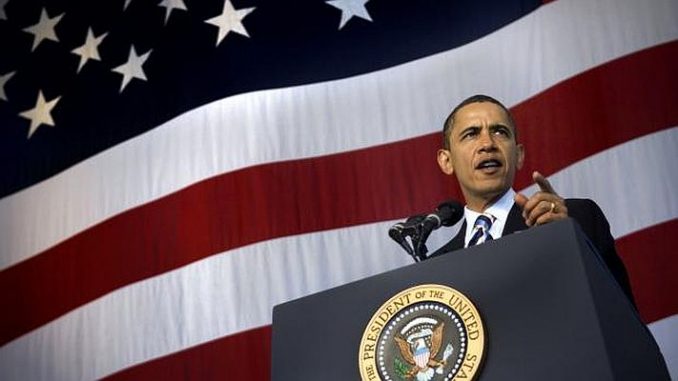
Encryption Freedom- A coalition of technology industry giants, security experts, privacy advocates and human rights organizations have asked President Obama to stop government’s access to encrypted data.
New America’s Open Technology Institute, sent a joint letter dated 19th May 2015 to the President, urging him to support strong encryption and to defend American’s rights to data protection.
It asks the President to oppose mandatory ‘backdoors’ to encrypted data services, which allows government access in the name of security, but undermines overall security, privacy and fair play.

BYPASS THE CENSORS
Sign up to get unfiltered news delivered straight to your inbox.
You can unsubscribe any time. By subscribing you agree to our Terms of Use
Latest Video
The joint letter was signed by nearly 150 privacy and human rights organizations, technology companies and trade associations, and individual security and policy experts. The letter to the White House, signed by technology giants such as Apple, Google, Facebook, Microsoft and others, follows the ongoing debate over encryption and the government’s access to encrypted data in the name of security.
New America reports:
The letter, signers of which include technology industry giants such as Apple and Google, is the latest round in the ongoing debate over encryption first sparked by Apple’s announcement last fall that new iPhones would be encrypted by default. Responding to statements by law enforcement and intelligence officials such as FBI Director James Comey, who have criticized companies’ deployment of encryption and suggested that Congress should legislate to prevent access to encryption that the government can’t break, the letter explains:
Strong encryption is the cornerstone of the modern information economy’s security. Encryption protects billions of people every day against countless threats—be they street criminals trying to steal our phones and laptops, computer criminals trying to defraud us, corporate spies trying to obtain our companies’ most valuable trade secrets, repressive governments trying to stifle dissent, or foreign intelligence agencies trying to compromise our and our allies’ most sensitive national security secrets.
Therefore, says the letter to the President,
We urge you to reject any proposal that U.S. companies deliberately weaken the security of their products. We request that the White House instead focus on developing policies that will promote rather than undermine the wide adoption of strong encryption technology. Such policies will in turn help to promote and protect cybersecurity, economic growth, and human rights, both here and abroad.
The letter, in addition to being signed by leading Internet, software, and hardware companies such as Adobe, Cisco, Hewlett-Packard, Facebook, and Microsoft, is also signed by a range of trade associations such as the Internet Association and the Consumer Electronics Association, and dozens of civil society organizations devoted to civil liberties, human rights, and press freedom, such as the Electronic Frontier Foundation, Human Rights Watch and the Reporters Committee for Freedom of the Press. It also is signed by nearly sixty individual computer security and policy experts including Whitfield Diffie, one of the inventors of modern public key cryptography, and former White House anti-terrorism czar Richard Clarke. The Center for Democracy & Technology, one of the signing civil society organizations, also played a critical role in recruiting and organizing the many computer security experts that lent their voices to the effort.
The following can be attributed to Kevin Bankston, Policy Director of New America’s Open Technology Institute and Co-Director of New America’s Cybersecurity Initiative:
Knowing that the White House is currently weighing the issue, we thought it important to ensure that President Obama heard now a clear and unified message from the Internet community: encryption backdoors are bad for privacy, bad for security, bad for human rights, and bad for business. They’re just bad policy, period, which is exactly the same answer that policymakers arrived at during the Crypto Wars of the 90s after many years of informed debate, and the same answer the the House of Representatives arrived at just last year when it voted to stop the NSA from mandating or even requesting that companies weaken the security of their products for surveillance’s sake.
Since last fall, the President has been letting his top intelligence and law enforcement officials criticize companies for making their devices more secure, and letting them suggest that Congress should pass anti-encryption, pro-backdoor legislation. That’s despite unanimous consensus in the technical community that backdoors are bad for security, and despite lawmakers clearly signaling that they think it’s a bad idea–most recently in a House oversight hearing where every lawmaker in attendance was critical of the government’s position, one of them going so far as to call the idea of backdoors “technologically stupid“.
We decided it was time for the Internet community–industry, advocates, and experts–to draw a line in the sand. We’re calling on Obama to put an end to these dangerous suggestions that we should deliberately weaken the cybersecurity of American products and services. We’re asking the White House to instead throw its weight behind the recommendation of the President’s own hand-picked NSA review group, several of whom signed today’s letter: it should be the policy of the US government to support rather than undermine the availability and use of strongly encrypted products.
Put simply, it’s time for the White House to come out strong in support of strong encryption, here in the U.S. and around the globe. Securing cyberspace is hard enough without shooting ourselves in the foot with government-mandated vulnerabilities. It’s time for America to help lead the world toward a more secure future, rather than toward a digital ecosystem riddled with vulnerabilities of our own making.”
A copy of the letter with a full list of signers is available here.


